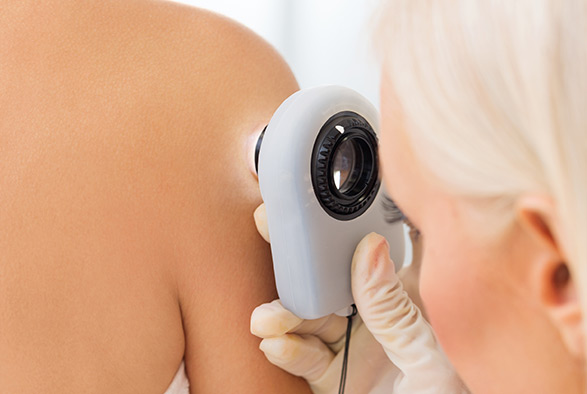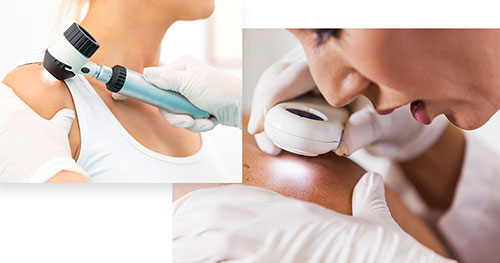
Expert Care for Skin Cancer Diagnosis and Treatment
What is Skin Cancer?
Skin cancer, like other forms of cancer, is caused by an abnormal growth of cells, in this case the growth is within your skin cells.
Skin cancer can manifest anywhere on your body. However, it is most likely to occur on skin that has had exposure to sunlight. The most common areas are the face, neck, hands, and arms.
Keeping track of the changes to your body is an extremely important step in staying healthy. In turn, tracking the changes your skin experiences and seeking skin cancer treatment as needed are important for being proactive about skin cancer.
Every year over 1.3 million Americans are diagnosed with skin cancer. If you have a history of skin cancer in your family, you should visit a skin cancer dermatologist near you yearly for an annual body exam.
There are six types of skin cancer:
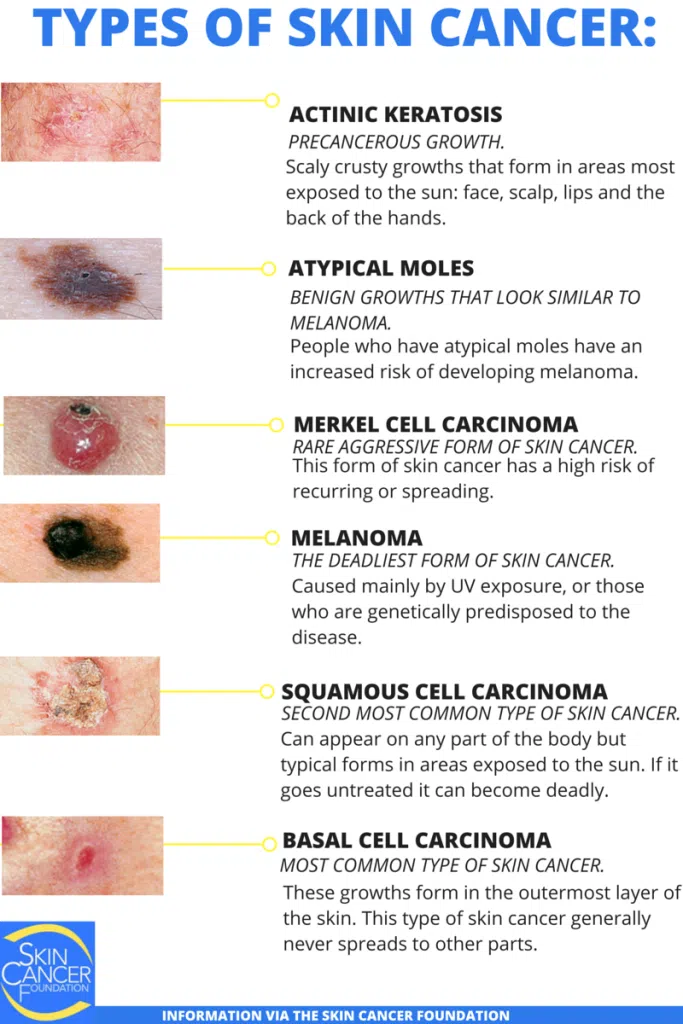
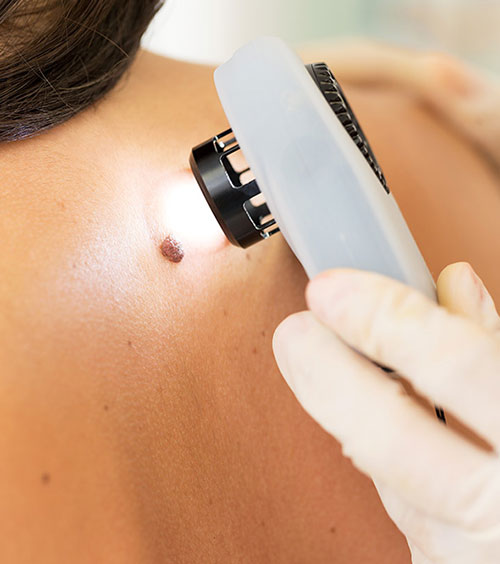
Three Most Common Types of Skin Cancer
Basal Cell Carcinomas are the most common type of skin cancer. They originate from the deepest part of your epidermis (i.e., basal layer) and usually occur from overexposure to sun. They are usually not life threatening and can easily be treated with specialized basal cell carcinoma treatments, like surgical excision.
Squamous Cell Carcinoma is the second most common type of skin cancer. These show up on your top layer of skin and are commonly mistaken for sores. They might appear as sores on your skin, but they do not go away. They can be caused by overexposure to the sun and while usually not life threatening, they do kill about 3,000 people a year.
Melanoma is a life-threatening skin cancer. It usually starts in the melonomyte layer of the skin, but they can (in rare, advanced stages) even affect your organs.
About 8,000 people die each year in the U.S. from melanoma. If caught early, professional melanoma treatment can help cure it.
It’s important to perform self-examinations of your skin to look for irregularities that might be precursors to melanoma. Follow the ABCDE rule (Asymmetry, Border Irregularity, Color, Diameter, and Evolving characteristics) usually found with moles to detect if anything seems out of place.
There are five types of melanoma, they include:
- Superficial spreading (most common and slow growing)
- Lentigo maligna (superficial and slow growing)
- Acral lentiginous (slow growing)
- Desmoplastic (slow growing)
- Nodular (fast-growing and aggressive)
How Do I Know If It’s Skin Cancer?
Have you noticed a new mole on your skin, or maybe a mole has gotten bigger? These are things to note and alert your skin cancer dermatologist of during your visits. The American Academy of Dermatology outlines five characteristics to look for when examining moles and growths on your skin. They are known as the ABCDE’s of melanoma.
Our skin cancer diagnosis and treatment experts are in Bergen County, NJ, Queens, NY, Long Island, NY, and other locations.
- Asymmetry – Is the new mark asymmetrical? If one half of the spot is unlike the other half, the mark may need further examination.
- Border – An irregular or ill-defined border is another warning sign of melanoma. If the edges are not smooth take notice and contact a dermatologist.
- Color – Is the mark one solid color, or does it contain varying shades of tan, brown, black, white, or red? Benign skin marks are often one solid color, so color variation is cause for concern.
- Diameter – Melanomas are usually 6mm or bigger. This is about the size of a pencil eraser, so it may need to be looked at if the spot is bigger than that. Although if you suspect the mark for other reasons, don’t hesitate to get it checked out just because it’s tiny! Early detection can save your life!
- Evolution – Contact your dermatologist immediately if you have a mark that you notice is evolving or changing over time.
Remembering the A-B-C-D-E rules can save your life, so examine yourself frequently and report any irregularities to your dermatologist.
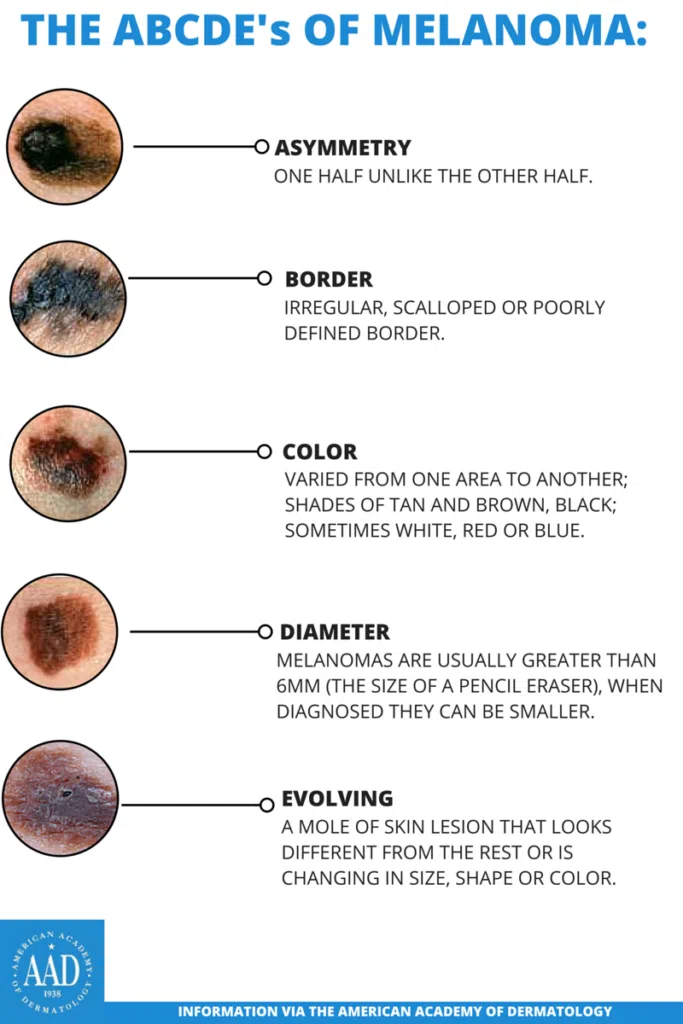
Discovering Pre-Cancer
Skin Cancer may be discovered early on while still a benign precancer. One pre-cancer is known as Actinic keratosis. This shows up as scaly, crusty, small bumps that can be found on or underneath the skin. Tumors, lesions, and odd discolored skin can be indicators of pre-cancer and you should be on the lookout for these warning signs.
The reason pre-cancer is important to find and treat is that in these areas though harmless now may turn into skin cancer, even malignant skin cancer. These areas can be seen and felt and are noticeable.
How We Can Help You
We believe in empowering our patients with the tools they need to overcome cancer. We will develop a personal and individualized skin cancer treatment program that will be the most effective for your specific case.
Our expert dermatologists have the experience, expertise, and knowledge to effectively treat malignant and non-malignant skin cancers. In addition, we offer yearly free skin cancer screenings at designated locations.
Our skin cancer dermatologists offer several treatment options across Queens, NY, Bergen County, NJ, and elsewhere will help you determine if you have any skin cancer symptoms.
Skin Cancer Treatments at Advanced Dermatology, P.C.
Keeping your skin as safe as possible is our mission. At Advanced Dermatology, P.C., all our physicians and assistants are fully experienced and equipped in detecting and treating skin cancer. We offer the following treatments:
Freezing
Also called cryosurgery. This procedure utilizes liquid nitrogen, a very cold gas, at a temperature of -50°C or (-58°F) to freeze off the skin cancer lesion. If you have a bleeding disorder, or if you do not want a different procedure, freezing is the treatment for you. It is more likely though, to reoccur after this technique.
X-ray
Also called Radiotherapy or radiation therapy, this type of treatment directs a dose of radiation at the target area. The radiation energy emitted, damages and destroys the cancer cells. The radiation does not distinguish between healthy or harmful cells, but destroys them all. This is sometimes used to remove internal cancers. Most patients don’t like this therapy as it can take 20 to 30 treatments.
Scraping
Also called curettage. This skin cancer treatment involves using a spoon shaped tool to scrape away the skin removing the cancer cells. The scraped skin may bleed and is many times used with electrosurgery to control any bleeding that might occur. This procedure is only for separated cancer.
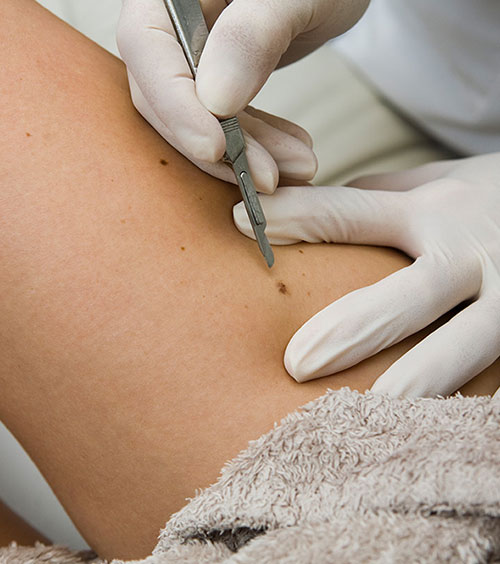
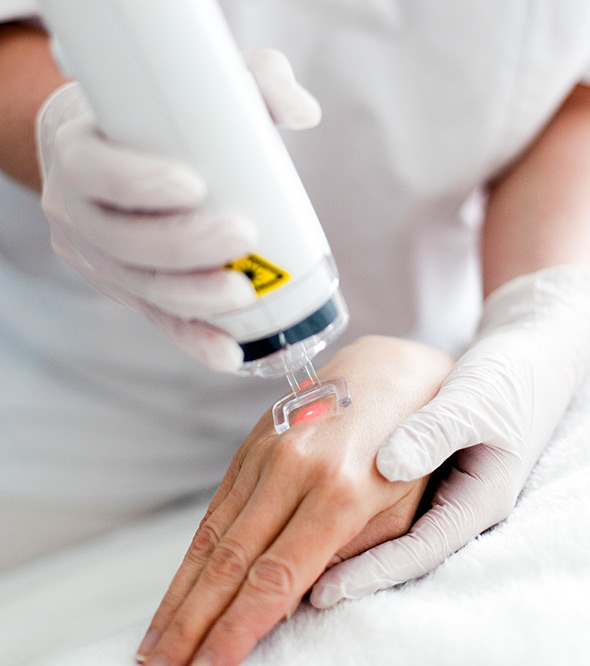
Excision
This is a small minor surgery. During this procedure, the area of skin cancer is cut out, along with a margin of healthy skin surrounding it. This margin area is then examined to see if all of the skin cancer has been removed. After an excision, stitches may be needed to close it up.
Laser
Laser therapy uses lasers on the target area and focuses a beam of light to remove the skin cancer. Laser therapy is mainly used to treat cancer on the surface of the skin, and for some internal organs. This procedure cannot tell if the cancer is completely out.
Mohs
This is called micrographic surgery. It is the most effective method to remove skin cancer. Mohs surgery is a process where each layer of the cancer is removed and examined then to see if it was all removed. It is commonly used for sensitive areas such as the face.
Meet Our Mohs Surgeon: Dr. Aza Lefkowitz

Board certified in both dermatology and Mohs microsurgery, Dr. Lefkowitz has been a member of Advanced Dermatology, P.C. and the Center for Laser and Cosmetic Surgery since 2001.
He has also authored over a dozen peer-reviewed research papers and presentations on skin cancer.
Learn more about MOHS skin cancer surgery available at our facilities.
Skin Cancer Radiotherapy
Skin cancer radiotherapy treats non-melanoma skin cancers found on the surface of the skin. Using a technology called Superficial Radiotherapy (SRT), lesions on the chest, back, arms, and legs can be effectively treated. SRT is especially useful for difficult to treat skin cancers located on the head and neck regions including the nose, ears, eyelids, lips, and scalp, where surgical excision may leave cosmetically undesirable results. SRT is also a great skin cancer treatment option for patients considered too high risk for surgery.
Frequently Asked Questions
I am concerned about a birthmark, what should I do?
If you are concerned about a mole or birthmark on your body, it is advisable to see a doctor. Melanoma can grow and spread quickly. That is why it is important not to wait to have a spot checked. The ABCDE method is often used to recognize a melanoma. Check the spot for Asymmetry, Borders, Color, Diameter and Evolution. Changing spots are always suspicious. Advanced Dermatology, P.C. offers yearly free skin cancer screenings. You can find our expert skin cancer dermatologists in Queens, Bergen County, NJ, Long Island, NYC, and elsewhere in New York and New Jersey.
How does skin cancer develop?
Most forms of skin cancer arise due to an overload of ultraviolet (UV) radiation from the sun or a sunbed. The UV radiation causes damage to the genetic material (DNA) of the skin cells. In most cases, these damaged cells are cleaned out by the body’s immune system. However, if there are too many damaged cells, some derailed cells escape the immune system. These cells can grow into skin cancer. In addition, there are some rare forms of skin cancer caused by, for example, the derailment of white blood cells in the skin (lymphomas), the derailment of connective tissue cells (sarcomas) or if there is an inherited predisposition.
Does skin cancer spread to other places in the body?
This depends on the type of skin cancer. Melanomas are the most aggressive type of skin tumors. They can spread and it is therefore important that this form of skin cancer is diagnosed and treated as quickly as possible. Squamous cell carcinoma can also spread. This means the sooner it is recognized and treated, the smaller the risk of metastases. Basal cell carcinomas generally do not spread and grow slowly, but they can cause a lot of damage locally.
Advanced Dermatology, P.C. offers annual free skin cancer screenings and several affordable skin cancer treatments at their offices in Queens, Long Island, NYC, Bergen County, NJ, and elsewhere across New York and New Jersey.
Dr. Joshua Fox: “Sunscreen is a key element of a sun protection program, but it isn’t enough. You should stay out of the sun when rays are the strongest, cover up with clothing and a wide-brimmed hat, and wear UV-blocking sunglasses.” Read more.
Dr. Romeo Morales: “Use a broad spectrum sunscreen year round with a SPF of at least 30. Apply 30 minutes prior to going into the sun and reapply every two hours.” Read more.
Dr. Suzanne Friedler: “People need to be reminded that most sun damage doesn’t happen from sitting on the beach, but from being in the sun while doing daily activities including outdoor sports.” Read more.
Dr. Whitney Bowe: “7 Places you’re probably forgetting to put sunscreen: Scalp, lips, eyelids, tops of your hands, your shoulders, the tops of your feet.
Dr. Robert Levine: “Winter sun can be even more harmful, in part because we don’t feel the heat and don’t perceive the risk but also because the sun’s rays are stronger at higher altitudes and when they reflect off snow. Avoid the sun at midday, especially at high elevation: Try to stay out of the sun between 10am and 4pm when the sun’s rays are strongest.” Read more.

